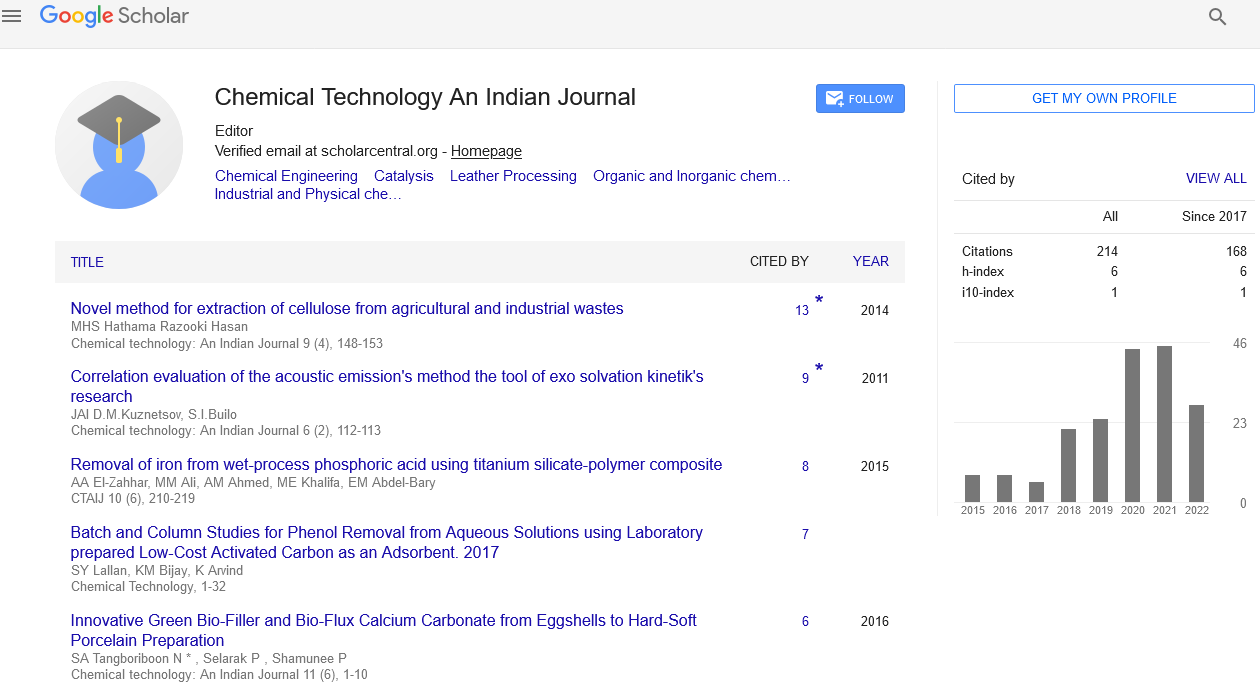Editorial
, Volume: 16( 2)Biotechnology: An Emerging Field In Science
- *Correspondence:
- Jennifer Stewart
Editorial office, Chemical Technology: An Indian Journal, United Kindom
E-mail: chemtech@alliedresearch.org
Received: March 04, 2021; Accepted: March 14,2021; Published: March 24,2021
Citation: Stewart J. Biotechnology: An Emerging Field in Science. Chem Technol Ind J. 2021;16(2): 137.
Abstract
Biotechnology, at its most basic level, is biology-based technology: it uses cellular and biomolecular processes to create technologies and products that help us live better lives and improve the health of our planet. For almost 6,000 years, we've relied on the biological processes of microorganisms to create valuable food products like bread and cheese, as well as to preserve dairy products. Modern biotechnology enables us to combat debilitating and rare diseases, minimise our environmental impact, feed the needy, use less and cleaner energy, and create safer, cleaner, and more efficient industrial manufacturing processes.
Introduction
Biotechnology, at its most basic level, is biology-based technology: it uses cellular and biomolecular processes to create technologies and products that help us live better lives and improve the health of our planet. For almost 6,000 years, we've relied on the biological processes of microorganisms to create valuable food products like bread and cheese, as well as to preserve dairy products.
Modern biotechnology enables us to combat debilitating and rare diseases, minimise our environmental impact, feed the needy, use less and cleaner energy, and create safer, cleaner, and more efficient industrial manufacturing processes.
Biotech is assisting in the healing of the globe by utilising nature's toolbox and utilising our own genetic composition to heal and direct research lines through changing the odds of serious, life-threatening diseases that impact millions of people all over the world and individualizing therapies to reduce health risks and adverse effects; developing more precise disease detection techniques; and combating serious illnesses and everyday challenges that the poor world faces.
To create microscopic manufacturing facilities, biotech employs biological processes such as fermentation and biocatalysts such as enzymes, yeast, and other microbes. Biotechnology contributes to the world's energy supply by increasing the efficiency of chemical manufacturing processes by at least 80%, lowering the temperature for washing garments, which might save $4.1 billion each year; Improving industrial process efficiency to save 50% or more on operational expenses; reducing petrochemical use and dependency, using biofuels to reduce greenhouse gas emissions by 50% or more. Using less water and producing less waste; and utilising the full potential of traditional biomass waste products.
Biotechnology boosts agricultural pest resistance, herbicide tolerance, and the adoption of more ecologically friendly farming practises. Biotechnology is assisting in the world's food supply by increasing crop yields while using less inputs; reducing the amount of agricultural chemicals used by crops and limiting product run-off into the environment. Using biotech crops that require fewer pesticide applications and allow farmers to reduce agricultural tilling; Creating crops with improved nutritional profiles to address vitamin and nutrient deficiency. Producing foods that are free of allergens and contaminants like mycotoxin; and enhancing the nutritional value of foods and agricultural oils to help enhance cardiovascular health.
Patients now have access to more than 250 biotechnology health care items and vaccinations, many of which are for diseases that were previously untreatable. Agricultural biotechnology is used by more than 13.3 million farmers throughout the world to boost yields, avoid insect ands pest damage, and lessen the environmental effect of farming.
Furthermore, more than 50 biorefineries are being constructed across North America to test and enhance methods for producing biofuels and chemicals from renewable biomass, which can help reduce greenhouse gas emissions. Biotechnology advancements are assisting us in preparing for and meeting society's most pressing concerns.

